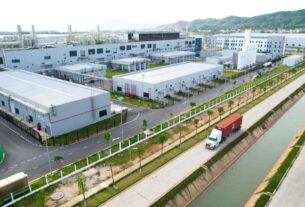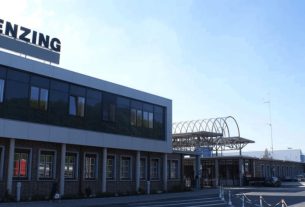 Green public transport in Bangkok seen as key to tackling climate change
Green public transport in Bangkok seen as key to tackling climate change
Several Alstom projects aim to address pressing issues affecting the environment
Carriages at rest for the MRT’s Pink Line electric rail project. The 34.5-kilometre rail link between Nonthaburi and Min Buri is designed to accommodate commuter demand in northern Bangkok.
Soaring gas prices coupled with high carbon emissions from vehicles mean efforts to foster a reliable and environmentally friendly mode of public transport are key to helping Bangkok achieve its green ambitions, says Katrin Luger, the managing director of Alstom Thailand.
The Thai government has drafted a range of initiatives, such as the Climate Change Act, the national energy plan, and the long-term low greenhouse gas emissions development strategy, to tackle the issues.
The country’s 20-year transport systems development strategy also includes developing intercity rail links and a focus on green transport.
WHAT IS GREEN MOBILITY?
The term green mobility is often broad, but Ms Luger said it was a critical macro-level element in the megatrends of urbanisation.
Overcoming hate, Brazilian heads to Trans Miss Universe
Rejection hurts, marriage no-go, any disguise will do
Facial paralysis sidelines Justin Bieber
“As the population grows, and especially in cities, there is an increasing need to move people safely and sustainably from A to B, which increases the demand not only for rail but for all modes of transport,” she said.
According to the International Energy Agency (IEA), transport contributes about 27% of all global emissions. The top five types, ranging from the most polluted to the least, are large cars, aviation, cars, buses, two- or three-wheelers and rail.
Transport is the only sector that has increased its carbon emissions over the last 20 years.
“If you look at the carbon footprint, especially compared to travel by road, in fact, only about 3.5% of the transport sector’s CO2 emissions come from rail. I am convinced that if we strive towards a more carbon-neutral world, rail transport has a key role to play both in the transport of passengers and also in the transport of goods,” said Ms Luger.
CONGESTION AND POLLUTION
Congestion and pollution are two great challenges for Bangkok. Authorities, including the new Bangkok governor and Thailand’s prime minister, have talked about how sustainability could play a key role in the post-pandemic economic recovery.
As for the private sector, Alstom, which has a four-decade history of operating in Thailand, currently has several projects that aim to address pressing issues affecting the environment, and also training programmes that foster Thailand’s talent pool.
Highlighting smart technology, Thailand’s Alstom-supplied BTS Yellow Line is the first automated monorail in the country. The unmanned Alstom Innovia APM 300 monorails can reach a maximum speed of 80 km per hour. The line officially started testing towards the end of October last year. It is set to carry approximately 42,000 passengers per day.
Furthermore, Alstom is also supplying 42 four-car and 30 four-car driverless Innovia monorail trains for the Bangkok Pink and Yellow lines. The 34.5-km-long rail link between Nonthaburi and Min Buri — also known as the Pink Line — is designed to accommodate commuter demands in northern Bangkok. The 30.4-km Yellow Line monorail system, with 23 stations in total, will shuttle commuters between Lat Phrao in Bangkok and Samrong in Samut Prakan.
“The Pink and Yellow lines are monorails, which is a fantastic innovation that we’re bringing to Bangkok. And in full capacity, that system will be able to transport about 400,000 passengers a day. Imagine that every 10th passenger would have taken a car instead. So that’s 40,000 more or fewer cars on the road every day,” Ms Luger said.
Other projects include providing 113 diesel locomotives to the State Railway of Thailand, laying down track works for the Blue Line and Green Line extension, and servicing signalling for the Bangkok Purple Line through Alstom’s 10-year contract.
STRENGTHEN THE RAILWAYS
In terms of education, Alstom recently partnered with Chulalongkorn University’s Faculty of Engineering. The two parties signed a memorandum of understanding this month to foster greater collaboration in local industry research and development, as well as educational and training programmes in this highly specialised field of railway engineering over the next five years.
Supot Teachavorasinskun, dean of Chula Engineering, said that the increasing demand for professional human resources in Thailand’s transportation development has raised students’ interest in railway engineering.
“The expertise of Chula Engineering, such as mechanical engineering, electrical engineering, civil engineering, and others, can help build the foundation and theories. And when students can engage in practice with market-leading players like Alstom and learn the real applications in the industry, they will be able to enhance their skills and sharpen their knowledge,” he said.
Meanwhile, Alstom also uses Bangkok as its global engineering delivery centre in Asia-Pacific for rail signalling and systems integration. There are over 400 engineers at the company, of which 85% are Thai, with the rest coming from 25 different countries.
Source: https://www.bangkokpost.com/business/2322022/green-public-transport-seen-as-key-to-tackling-climate-change


